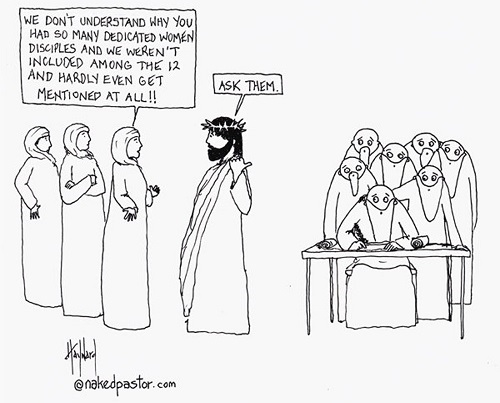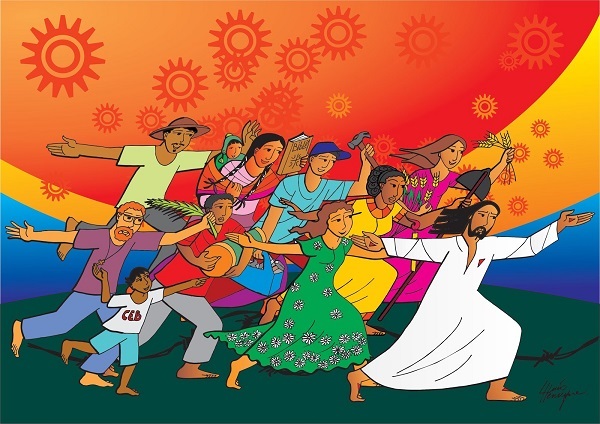In the Christian tradition, we are at the threshold of a new Advent. As Pope Francis has suggested, we are not living an era of change but a change of era. This meditation explores this "change of era" as a radical transition from the patriarchal culture that has prevailed since the inception of human history to a new culture of solidarity and sustainability. Such a transition offers hope for a renewal of humanity as an indispensable response to the ecological crisis.
In a superb article entitled Ecological Economics for Humanity's Plague Phase, William Rees provides a comprehensive evidence-based analysis of the currently unfolding ecological crisis and the undeniable human predicament. This is the abstract:
"The human enterprise is in potentially disastrous ‘overshoot’, exploiting the ecosphere beyond ecosystems’ regenerative capacity and filling natural waste sinks to overflowing. Economic behavior that was once ‘rational’ has become maladaptive. This situation is the inevitable outcome of humanity’s natural expansionist tendencies reinforced by ecologically vacuous growth-oriented ‘neoliberal’ economic theory. The world needs a more ecologically-informed economics yet, despite its self-description, contemporary ‘ecological economics’ does not adequately reflect key elements of human evolutionary and behavioral ecology. How should the discipline develop? his paper briefly considers some of the missing pieces that are particularly relevant to humanity’s econoecological predicament: competitive displacement of non-human species through habitat and resource appropriation; humans as exemplars of the maximum power principle; the implications of ‘far-from-equilibrium’ thermodynamics; and evidence that Homo sapiens is in the plague phase of a global population cycle. I then describe some of motivational and cognitive roots of crisis denial that extend even into the 2015 Paris climate accord. The paper concludes with: a) a list of principles for ecological economics consistent with the analysis and; b) a minimal set of policy actions necessary for the global community to achieve a more equitable steady-state economy and stable population within the biocapacity of nature."
The principles and policy actions recommended by Rees make sense in terms of economics and human ecology (read the article for details). However, can they be implemented in the current "plague phase" of human civilization?
No, because the patriarchal culture makes it impossible. The patriarchal mindset of male domination and female (including Mother Nature) subordination, which has prevailed across all cultures since the agricultural revolution, is the cultural axis of pervasive habitat exploitation, the abusive use of power (exacerbated by the industrial revolution and the use of fossil fuels), and other symptoms of planetary dysfunction, possibly even including climate change. Nevertheless, with regard to "the plague phase of a global population cycle," there are signs that this plague phase is the final stage of the patriarchal age. How can a cultural mutation be fostered, from patriarchy to cooperative solidarity and ecological sanity, that will make possible the corrective actions that are now practically impossible?
In secular institutions, such as governments and corporations, it is politically incorrect, and therefore practically impossible, to prioritize the long-term ecological common good over short-term profits. In most regions of the world, patriarchy still prevails in family life for cultural and religious reasons, although there are signs of impending institutional change. Is it conceivable that religious institutions could become a catalyst for cultural evolution away from patriarchy?
Yes, it is conceivable, because faith is always the same yet the source of ever new light. Roughly 80% of the world population profess adherence to a religious tradition. The Catholic Church alone is 1.2 billion people strong. If religious institutions let go of religious patriarchy, these institutions could be catalysts for a renewal of humanity and a new order of things in family, society, and the entire web of life all over the world.
In the case of the Judeo-Christian tradition, consider the progression from Genesis 3 to Luke 1. The curse of Genesis 3:16, a 1000 BCE social reality projected back to the beginning, marks the inception of patriarchy as a consequence of original sin. Before original sin, there had been no "male headship" between Adam and Eve. After original sin, male headship is the first and most universal rupture of the original communion of man and woman, whence all other forms of vice and violence derive. Luke 1-2, and the parallel stories in the other gospels, beautifully reveal a crucial crossover point in human history. The incarnation is the beginning of the end of patriarchy. Since the Word became flesh, we have seen the Second Temple collapse, our planet ceasing to be regarded as the center of the universe, and slavery ceasing to be taken for granted as natural law; and now we are witnessing the gradual but irreversible disintegration of patriarchy and male headship across all cultures worldwide. Feminism is a sign of the times. Culturally, socially, and ecologically, Galatians 3:28 is finally coming to pass!
Specifically with regard to male headship, what about the Holy Family of Nazareth? Even though Joseph was, in conformance with the social order of the time, the head of the family, it is clear that, anticipating the new order of the redemption, Mary was the spiritual head of the family. She is Mother of God, Mother of Christ, Mother of the Eucharist, always joined to Christ, Head of the Church, and more so than any priest or bishop could ever be. In the Marian dimension of the church, which precedes the Petrine, Mary is head. Just as in Mary the patriarchal order is turned upside down, may the same cultural shift come to pass in the hierarchical church and in society at large; else, the future of humanity is grim.
And what about the 12 men chosen by Jesus to be apostles? Only the names of 12 male disciples are listed as apostles in the gospels, but it is noteworthy that 12 female disciples are also mentioned in ministerial capacities:
1. Mary of Nazareth, who preceded all the others (Luke 1:38, John 19:25)
2. Mary's sister, Jesus' aunt (John 19:25)
3. The mother of James and John Zebedee (Matthew 27:55-56)
4. Mary Magdalene (John 20:16)
5. Joanna, wife of Chuza (Luke 8:3)
6. Susanna (Luke 8:3)
7. Salome (Mark 15:40-41)
8. Mary, wife of Cleopas (John 19:25)
9. Simon Peter's mother-in-law (Matthew 8:15)
10. Martha, sister of Mary and Lazarus (John 11:27)
11. Mary of Bethany, who anointed Jesus (Matthew 26:7, John 12:3)
12. The Samaritan woman (John 4:39)
Source: Jennifer McKenzie, I Will Love Unloved, 1993
Given that the apostles were surprised to see Jesus talking with a woman (John 4:27), and given that they were dense to the very end (John 16:12-13) and wrote that they had been chosen to sit on twelve thrones to judge the 12 tribes of Israel (Matthew 19:28), it is not surprising that only the 12 males are listed as apostles. But what about the 24 elders mentioned later in Revelation 4:4? Could it be that there were 24 apostles, 12 males and 12 females?

Women Disciples ~ Art by David Hayward
Is this a fantasy? Perhaps. Is it a case of eisegesis rather than exegesis? Perhaps. But, would Jesus, in today's church, choose 12 males to represent the patriarchs of the 12 tribes of Israel? Assuming that the risen Christ still has common sense, it is self-evident that he would choose both men and women for apostolic succession:

Following Christ ~ Art by Luís Henrique Alves Pinto
The patriarchal phase of human history is passing away. Religious patriarchy is becoming obsolete. The apostolic letter Ordinatio Sacerdotalis defends the right of church authority to choose whom to ordain (Catechism 1598), but the supporting rationale (Catechism 1577) assumes that a choice made by Jesus during his temporal ministry is normative after the resurrection, and this is not a dogma of the Catholic faith. The church is "one, holy, catholic, and apostolic," but not necessarily patriarchal. The patriarchal priesthood of the Old Law is no longer normative under the New Law.
For the mission of evangelization, for integral human development, and for an integral ecology, the church cannot remain fossilized in the patriarchal culture. It is ludicrous and nonsensical to keep insisting that the great mystery of Christ and the Church is no more than a patriarchal covenant, or that women do not have the same human nature assumed by Christ at the incarnation, or that women are not consubstantial with Christ as to his humanity, or that women are incapable of being sacramentally ordained to act in the person of Christ, or that women cannot be ordained to become successors of the apostles. What goes around comes around, and the male headship syndrome keeps doing harm to the entire body of Christ, and especially to men.
As long as the institutional church remains patriarchal, it remains in the plague phase that is now the final stage of the patriarchal age; and it is an obstacle, rather than a catalyst, for attaining a new civilization of social/ecological justice. In the Catholic Church, we now need celibate women in the priesthood and the episcopate.